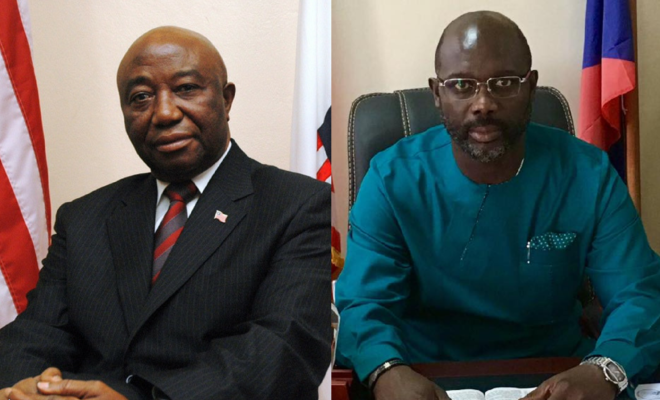Liberia’s Supreme Court has halted preparations for next week’s presidential run-off vote between former soccer star George Weah and Vice President Joseph Boakai after a losing candidate in the first round alleged fraud.
The decision casts further doubt on the Oct. 10 poll that losing parties say was marred by foul play at polling stations and at the highest levels of government.
Third-place finisher Charles Brumskine’s Liberty Party contested the results of last month’s vote, which set up a Nov. 7 run-off between former soccer star George Weah and Vice President Joseph Boakai.
The election is meant to usher in Liberia’s first democratic transition since 1944, after periods of military rule and civil war that ended in 2003.
It could also delay a second-round vote scheduled for Nov. 7 to find a successor to President Ellen Johnson Sirleaf, who won a Nobel Peace Prize in 2011 and is the country’s first elected leader since a 14-year civil war ended in 2003.
In a writ issued late on Tuesday, the court instructed the Liberty Party of third-placed Charles Brumskine, who made the complaint, and the National Elections Commission, to file briefs by Thursday.
“This is a big step in the right direction,” said Liberty Party Chairman Benjamin Sanvee. “The Court recognises the gravity of the issues and has taken action in defense of the law and democracy.”
This week, Boakai’s ruling Unity Party announced it was backing the legal challenge. It accused President Ellen Johnson Sirleaf, one of its own members, of interfering in the Oct. 10 vote by holding private meetings with election magistrates.
Johnson Sirleaf, who has governed for the last 12 years, denied the meetings were inappropriate. International observers like the European Union and the Carter Center have said that they saw no major problems with the first round vote.
The Supreme Court’s decision is an example of an increasingly assertive role some African judiciaries are playing in overseeing elections. Kenya’s Supreme Court annulled the results of a presidential election in August.
Weah won the first round with 38.4 percent of the vote to Boakai’s 28.8 percent. He has tapped into frustration with Johnson Sirleaf’s 12-year tenure, which has seen a post-war peace consolidated and the economy quadruple in size but has
failed to root out corruption and alleviate poverty.
Morluba Morlu, a senior official from Weah’s CDC party, said on Wednesday he still expected the run-off to go ahead next week.
“It is sad for a ruling party that has been in power for 12 years (to) be crying,” he said of Unity Party’s support for the legal challenge. “We don’t want any mockery of this election.”

